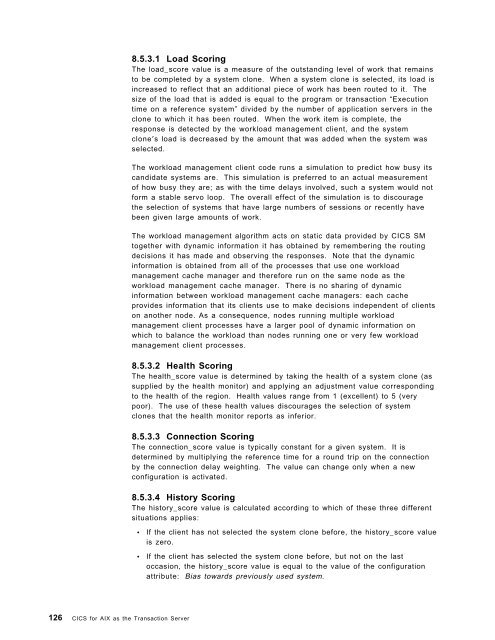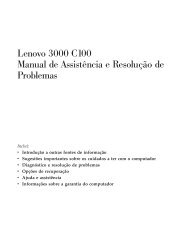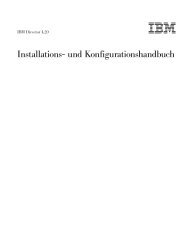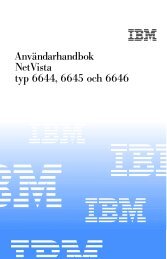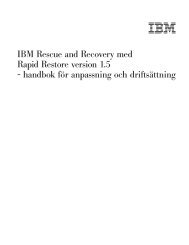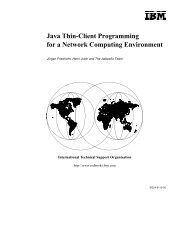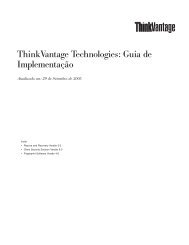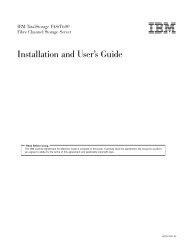Addressing OLTP Solutions with CICS: The Transaction Server ... - Ibm
Addressing OLTP Solutions with CICS: The Transaction Server ... - Ibm
Addressing OLTP Solutions with CICS: The Transaction Server ... - Ibm
Create successful ePaper yourself
Turn your PDF publications into a flip-book with our unique Google optimized e-Paper software.
126 <strong>CICS</strong> for AIX as the <strong>Transaction</strong> <strong>Server</strong><br />
8.5.3.1 Load Scoring<br />
<strong>The</strong> load_score value is a measure of the outstanding level of work that remains<br />
to be completed by a system clone. When a system clone is selected, its load is<br />
increased to reflect that an additional piece of work has been routed to it. <strong>The</strong><br />
size of the load that is added is equal to the program or transaction “Execution<br />
time on a reference system” divided by the number of application servers in the<br />
clone to which it has been routed. When the work item is complete, the<br />
response is detected by the workload management client, and the system<br />
clone′s load is decreased by the amount that was added when the system was<br />
selected.<br />
<strong>The</strong> workload management client code runs a simulation to predict how busy its<br />
candidate systems are. This simulation is preferred to an actual measurement<br />
of how busy they are; as <strong>with</strong> the time delays involved, such a system would not<br />
form a stable servo loop. <strong>The</strong> overall effect of the simulation is to discourage<br />
the selection of systems that have large numbers of sessions or recently have<br />
been given large amounts of work.<br />
<strong>The</strong> workload management algorithm acts on static data provided by <strong>CICS</strong> SM<br />
together <strong>with</strong> dynamic information it has obtained by remembering the routing<br />
decisions it has made and observing the responses. Note that the dynamic<br />
information is obtained from all of the processes that use one workload<br />
management cache manager and therefore run on the same node as the<br />
workload management cache manager. <strong>The</strong>re is no sharing of dynamic<br />
information between workload management cache managers: each cache<br />
provides information that its clients use to make decisions independent of clients<br />
on another node. As a consequence, nodes running multiple workload<br />
management client processes have a larger pool of dynamic information on<br />
which to balance the workload than nodes running one or very few workload<br />
management client processes.<br />
8.5.3.2 Health Scoring<br />
<strong>The</strong> health_score value is determined by taking the health of a system clone (as<br />
supplied by the health monitor) and applying an adjustment value corresponding<br />
to the health of the region. Health values range from 1 (excellent) to 5 (very<br />
poor). <strong>The</strong> use of these health values discourages the selection of system<br />
clones that the health monitor reports as inferior.<br />
8.5.3.3 Connection Scoring<br />
<strong>The</strong> connection_score value is typically constant for a given system. It is<br />
determined by multiplying the reference time for a round trip on the connection<br />
by the connection delay weighting. <strong>The</strong> value can change only when a new<br />
configuration is activated.<br />
8.5.3.4 History Scoring<br />
<strong>The</strong> history_score value is calculated according to which of these three different<br />
situations applies:<br />
• If the client has not selected the system clone before, the history_score value<br />
is zero.<br />
• If the client has selected the system clone before, but not on the last<br />
occasion, the history_score value is equal to the value of the configuration<br />
attribute: Bias towards previously used system.


